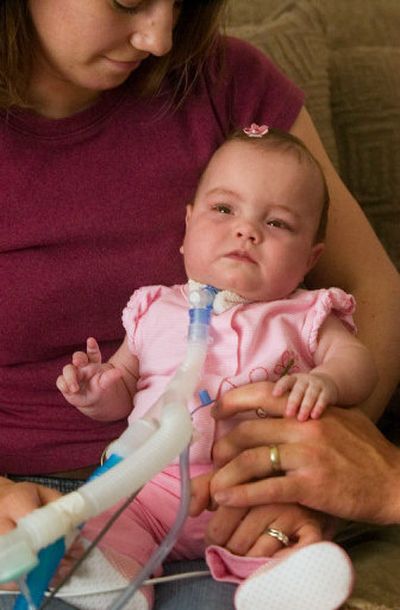Tiny miracle

Next time you have a snack — say a soda and a small square of chocolate — think of Halle Longwell.
Halle was born last July more than three months early, weighing just 12.9 ounces — about as much as that can of pop and piece of candy. She was 10.5 inches long and is one of the smallest babies born at Deaconess Medical Center to make it home alive.
“Usually babies that size don’t make it,” says Patrice Sweeny, assistant manager of the neonatal intensive care unit at Deaconess Medical Center.
Says Dr. Ron Shapiro, NICU medical director at Deaconess: “If you’re born under a pound, the survival rates are well below 20 percent, probably less than 10 percent.”
Halle’s parents, Brian and Nikki Longwell, had already been through that devastating experience. The high school sweethearts, just 23 years old, lost a baby girl at 22 weeks.
Nikki Longwell didn’t know it during that first pregnancy, but it was later discovered that she has Factor V Leiden, a blood disorder that can cause clots to form on the placenta. That’s why Halle was even tinier than other babies born at 26 weeks.
Doctors watched Longwell closely while she was pregnant with Halle. Longwell, who is so terrified of needles she passed out while getting her ears pierced, had to be injected with an anti-coagulant every morning. At 20 weeks of pregnancy, an ultrasound found that her amniotic fluid level was much too low. She spent three weeks on bed rest at home before the situation became so serious she was hospitalized.
It all happened right around the time in her first pregnancy that she lost the baby.
“My whole life, all I’ve ever wanted to be was a mom,” she says. “It was incredibly scary. It was really hard to get attached … It’s easy to just shut yourself down.”
But the Longwells couldn’t help but get attached. They decided to find out the baby’s gender. And they picked a name for her.
At 26 weeks, when Halle started having complications in the womb, she was delivered by Caesarean section.
Halle spent the next six months in the hospital and underwent a half dozen operations. Surgeons closed an opening in her heart. They inserted a central catheter line. She had laser eye surgery and had a feeding tube put in.
When she started having trouble breathing, doctors decided to perform a tracheostomy. She now breathes through the tube in her throat. She was off the ventilator and breathing on her own when she came home, but a recent respiratory infection landed her back on the machine.
Doctors believe the breathing problems will improve with time and that she won’t need the trach tube forever.
Tests have shown that Halle can’t hear very well, so she will soon be fitted for hearing aids and likely will receive cochlear implants when she’s a bit older.
Halle’s doctors and nurses have been particularly impressed with the Longwells, especially their maturity at such a young age.
“They are two of the most devoted parents I’ve seen,” Sweeny says. “Halle is very lucky to have the parents she has.”
Brian Longwell works in construction and just finished studies to become a general contractor.
The couple moved from Coeur d’Alene to Greenacres a few months ago to be closer to the hospital and to get better Medicaid coverage for Halle, Nikki Longwell says.
Since Halle needs constant monitoring, nurses come to the house most nights of the week.
Halle’s parents have become experts in her care, administering breathing treatments, suctioning her trach tube, bathing her and feeding her. So, it’s tough to give up control, even to get much-needed sleep.
“I wish I could do it all the time,” Nikki Longwell says.
Even with all of the equipment, her parents take Halle for walks, visits to grandma’s house and other outings.
“She has a lot of personality,” her mom says. “She has blessed our lives so much.”
She’s looking more like a healthy infant now, tipping the scales at about 11 pounds and wearing little pink outfits and bows in her wispy hair.
Halle will celebrate her first birthday on July 21. She probably won’t have a big celebration just yet since she still needs to be careful of infection.
It’s too soon to tell whether Halle will suffer any other problems from being born so early. After spending so many months in the hospital, she is developmentally behind other babies her age. But she loves to hold and look at her rattles and other toys. She can sit up with a little help. And she tries to roll over, though her trach tube stops her from going all the way.
In a few years, though, she’ll probably be racing around with the other kids her age, Sweeny says.
“With micropreemies, a lot of times by the time they reach grade school, they’ve caught up,” she says.
The Longwells dream about the day they can all just hop in the car and go camping. Or take Halle to the lake without considering how far they stray from the hospital. Or stop worrying about a minor cold turning into a life-threatening infection.
Until then, though, they’re enjoying every moment with Halle.
“I just can’t wait for the day when things feel a little normal,” Nikki Longwell says. “But, you know, I wouldn’t change a day of anything.
“It’s pretty amazing, these little babies. She has taught us all so much, just how to be happy despite your circumstances.”